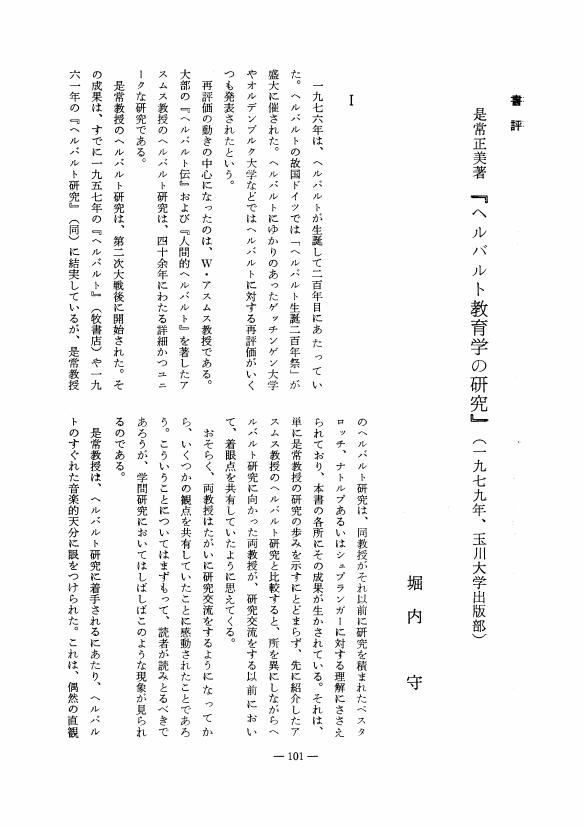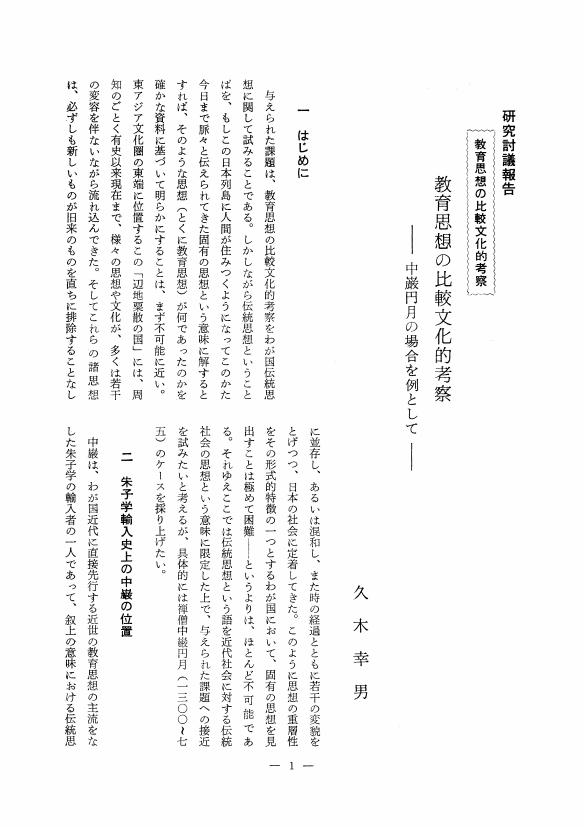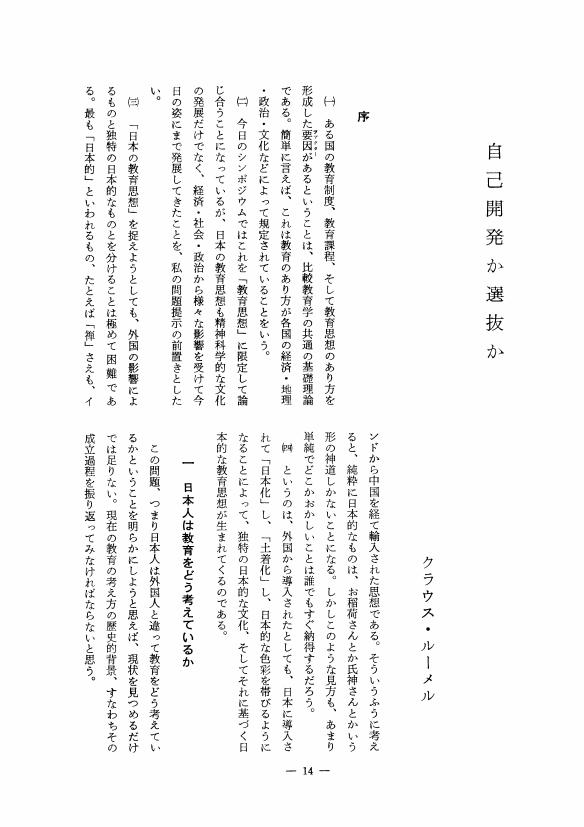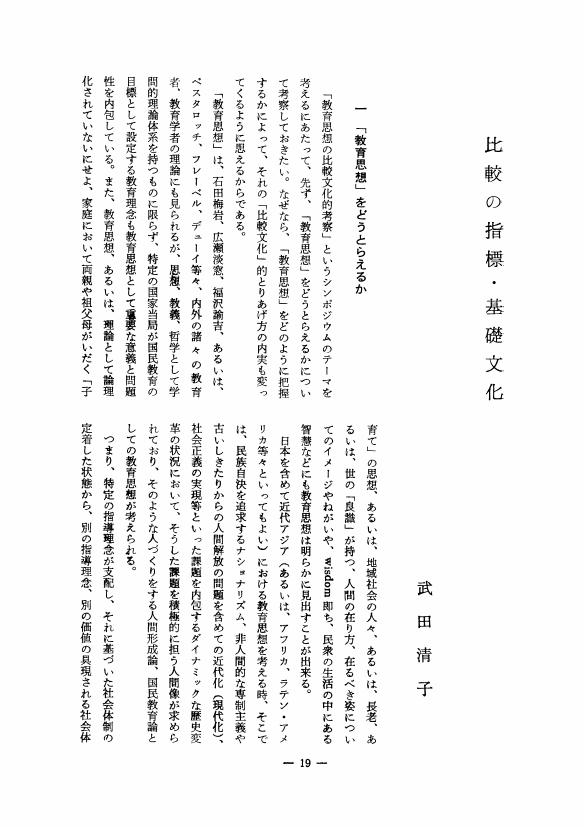1 0 0 0 OA 教育哲学・いくつかの最近の業績 I・シェフラーによる論評の紹介
- 著者
- 児嶋 雅典
- 出版者
- 教育哲学会
- 雑誌
- 教育哲学研究 (ISSN:03873153)
- 巻号頁・発行日
- vol.1981, no.44, pp.39-44, 1981-11-15 (Released:2009-09-04)
1 0 0 0 OA 西村 皓著『生の教育学研究』
- 著者
- 森田 孝
- 出版者
- 教育哲学会
- 雑誌
- 教育哲学研究 (ISSN:03873153)
- 巻号頁・発行日
- vol.1981, no.44, pp.45-49, 1981-11-15 (Released:2009-09-04)
1 0 0 0 OA エーリッヒ・E・ガイスラー著天野正治監訳『現代教育の危機』
- 著者
- 平野 智美
- 出版者
- 教育哲学会
- 雑誌
- 教育哲学研究 (ISSN:03873153)
- 巻号頁・発行日
- vol.1981, no.44, pp.50-56, 1981-11-15 (Released:2009-09-04)
1 0 0 0 OA 宇佐美 寛氏の書評にこたえる
- 著者
- 向山 洋一
- 出版者
- 教育哲学会
- 雑誌
- 教育哲学研究 (ISSN:03873153)
- 巻号頁・発行日
- vol.1981, no.44, pp.57-62, 1981-11-15 (Released:2009-09-04)
1 0 0 0 OA 研究討議に関する総括的報告
- 著者
- 松川 成夫 長井 和雄
- 出版者
- 教育哲学会
- 雑誌
- 教育哲学研究 (ISSN:03873153)
- 巻号頁・発行日
- vol.1981, no.43, pp.25-30, 1981-05-10 (Released:2009-09-04)
1 0 0 0 OA W・ディルタイの「自己省察」 W・ディルタイにおける理論-実践関係の理解
- 著者
- 越後 哲治
- 出版者
- 教育哲学会
- 雑誌
- 教育哲学研究 (ISSN:03873153)
- 巻号頁・発行日
- vol.1981, no.43, pp.31-46, 1981-05-10 (Released:2009-09-04)
- 参考文献数
- 67
The author tries to clarify W. Dilthey's concept of 'self-reflection' (Selbstbesinnung) which based on a practical task from the outset runs through Dilthey's entire work, by analyzing his writings and his interpretation of the relation between theory and practice.While doing so, it was noticed that human self-reflection as the acting subject carries on a process of 'reciprocal action' involving nature, society and history. In consequence, this paper clarifies by explaining the meaning of 'reciprocal action', the principle of self-reflection which consist of a unification of the perceiving of reality and of the attributing of value.In fact, Dilthey, conscious of the crisis caused by rapid changes taking place in society, formulated the problem of how to lay the foundations of the human sciences (Geisteswissenschaften) and stressed the need for human self-reflection within the frame of reality perceived as a variety of reciprocal actions. This self-reflection is not merely a matter of concern for the individual, but it also issues in social reform. In that sense, self-reflection constitutes a very practical problem even as of today.
1 0 0 0 OA 学校教育における「対話」視点導入の意義 対話と教授の両極的全体の教育構造把握のために
- 著者
- 池野 正晴
- 出版者
- 教育哲学会
- 雑誌
- 教育哲学研究 (ISSN:03873153)
- 巻号頁・発行日
- vol.1981, no.43, pp.47-62, 1981-05-10 (Released:2009-09-04)
- 参考文献数
- 48
The process of human growth is understood to be a process of self-realization and understanding the world. O. Fr. Bollnow refers to language, more specifically to 'dialogue' (das Gespräch) in its concrete setting, as serving that purpose.Based on this theory of Bollnow, the author interprets school education in its polarity structure of 'dialogue' and 'instruction', adding some considerations on the task of the teacher resulting from these premises.In dialogue, man for the first time becomes his own self. By the activity of talking personal interior potentialities are being digged up, the self finds personal fulfilment. But because true dialogue matures suddenly transcending the limits of the original plan, and because it is not something which can be accomplished in a leisurely fashion, applied to instruction, its potentialities are all too uncertain. Therefore, what school education as intentional education can accomplish, is 'education toward dialogue', i. e. educating with the aim of paving the way for the capability of conducting true dialogue.But dialogue as a means and as a goal of education is intimately connected with the school function of 'instruction'. Here lies the rationale why school education as a whole can be conceived as a polarity structure of dialogue and instruction.
1 0 0 0 OA 「読み」の人間学的意味 アランの哲学の根底にあるもの
- 著者
- 小林 恭
- 出版者
- 教育哲学会
- 雑誌
- 教育哲学研究 (ISSN:03873153)
- 巻号頁・発行日
- vol.1981, no.43, pp.63-80, 1981-05-10 (Released:2009-09-04)
- 参考文献数
- 92
It is felt that something is lacking in the traditional approach toward the problem of 'dialogue'. The reason is that a difference between 'parole' and 'écriture' is being tacitly presupposed. Alain, in his educational theory, has re-emphasized education through 'lecture' (reading) and is critical concerning instruction by means of dialogue. It would, however, be a mistake to interpret this as simply ascribing value to 'écriture'. To the contrary, his ideas are very illuminating in view of building up the power of true dialogue. His educational theory rests on the foundation of a creative and well thought-out philosophy of 'signe'. He thinks that all 'signes' consist of 'langage absolu' and 'langage relatif'. Whenever relative language is dominant, and the absolute language which lies at its basis to support human thinking, is forgotten, thinking turns out to be mechanical and man is alienated from his true self. Alain thinks that the goal of education is that everybody recovers his own true self and realizes his spiritual freedom, but he maintains that in order to accomplish this, it is necessary that the absolute language be restored and the exercise of 'lecture' is necessary. The attempt is here made to clarify the reasons for this by referring to his philosophy which elucidated the hermeneutic structure of thought.
1 0 0 0 OA 世界教育連盟の国際会議に参加して WEFロンドン大会報告
- 著者
- 金子 光男
- 出版者
- 教育哲学会
- 雑誌
- 教育哲学研究 (ISSN:03873153)
- 巻号頁・発行日
- vol.1981, no.43, pp.81-86, 1981-05-10 (Released:2009-09-04)
1 0 0 0 OA 滞独報告 研究交流の深まりを求めて
- 著者
- 長尾 十三二
- 出版者
- 教育哲学会
- 雑誌
- 教育哲学研究 (ISSN:03873153)
- 巻号頁・発行日
- vol.1981, no.43, pp.87-92, 1981-05-10 (Released:2009-09-04)
1 0 0 0 OA ソルボンヌ 一九七九年=一九八〇年
- 著者
- 永冶 日出雄
- 出版者
- 教育哲学会
- 雑誌
- 教育哲学研究 (ISSN:03873153)
- 巻号頁・発行日
- vol.1981, no.43, pp.93-100, 1981-05-10 (Released:2009-09-04)
- 参考文献数
- 3
1 0 0 0 OA 是常正美著『ヘルバルト教育学の研究』 (一九七九年、玉川大学出版部)
- 著者
- 堀内 守
- 出版者
- 教育哲学会
- 雑誌
- 教育哲学研究 (ISSN:03873153)
- 巻号頁・発行日
- vol.1981, no.43, pp.101-104, 1981-05-10 (Released:2009-09-04)
1 0 0 0 OA 斎藤 勉著『デューイの教育的価値論』
- 著者
- 杉浦 宏
- 出版者
- 教育哲学会
- 雑誌
- 教育哲学研究 (ISSN:03873153)
- 巻号頁・発行日
- vol.1981, no.43, pp.105-110, 1981-05-10 (Released:2009-09-04)
1 0 0 0 OA マールブルク大学教育学科 教育学講座・学科の形成をめぐって
- 著者
- 林 忠幸
- 出版者
- 教育哲学会
- 雑誌
- 教育哲学研究 (ISSN:03873153)
- 巻号頁・発行日
- vol.1980, no.42, pp.67-72, 1980-11-25 (Released:2009-09-04)
1 0 0 0 OA 東岸克好著『ペスタロッチの直観教育思想の研究』
- 著者
- 大浦 猛
- 出版者
- 教育哲学会
- 雑誌
- 教育哲学研究 (ISSN:03873153)
- 巻号頁・発行日
- vol.1980, no.42, pp.94-99, 1980-11-25 (Released:2009-09-04)
1 0 0 0 OA 栗田 修著『デューイ教育学の起源』
- 著者
- 讃岐 和家
- 出版者
- 教育哲学会
- 雑誌
- 教育哲学研究 (ISSN:03873153)
- 巻号頁・発行日
- vol.1980, no.42, pp.100-104, 1980-11-25 (Released:2009-09-04)
本書の著者は、二十余年にわたるデューイ研究の成果に基づく業績を京都大学教育学部に提出して、昭和四七年五月に教育学博士の学位を受けた。本書はその学位請求論文に、その後得られた新しい資料をも検討して加筆し、あるいは書き換えを行なって、昨年末に刊行された研究書である。
1 0 0 0 OA 教育思想の比較文化的考察 中巌円月の場合を例として
- 著者
- 久木 幸男
- 出版者
- 教育哲学会
- 雑誌
- 教育哲学研究 (ISSN:03873153)
- 巻号頁・発行日
- vol.1981, no.43, pp.1-7, 1981-05-10 (Released:2010-01-22)
- 参考文献数
- 11
1 0 0 0 OA 日韓教育思想における戦前と戦後
- 著者
- 池 明観
- 出版者
- 教育哲学会
- 雑誌
- 教育哲学研究 (ISSN:03873153)
- 巻号頁・発行日
- vol.1981, no.43, pp.8-13, 1981-05-10 (Released:2009-09-04)
1 0 0 0 OA 自己開発か選抜か
- 著者
- クラウス ルーメル
- 出版者
- 教育哲学会
- 雑誌
- 教育哲学研究 (ISSN:03873153)
- 巻号頁・発行日
- vol.1981, no.43, pp.14-18, 1981-05-10 (Released:2009-09-04)
1 0 0 0 OA 比較の指標・基礎文化
- 著者
- 武田 清子
- 出版者
- 教育哲学会
- 雑誌
- 教育哲学研究 (ISSN:03873153)
- 巻号頁・発行日
- vol.1981, no.43, pp.19-24, 1981-05-10 (Released:2009-09-04)















